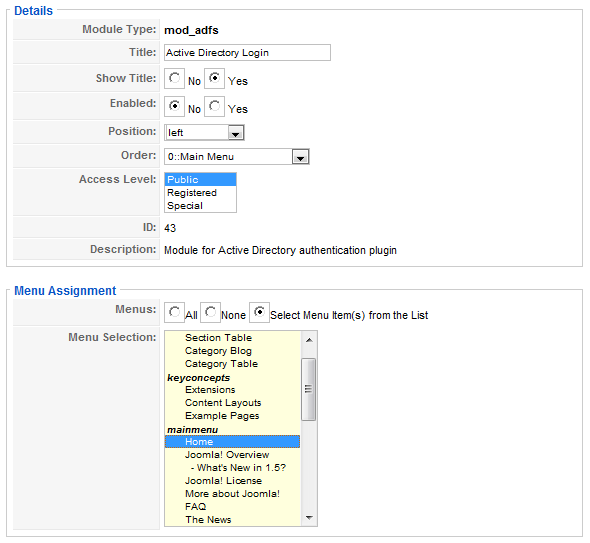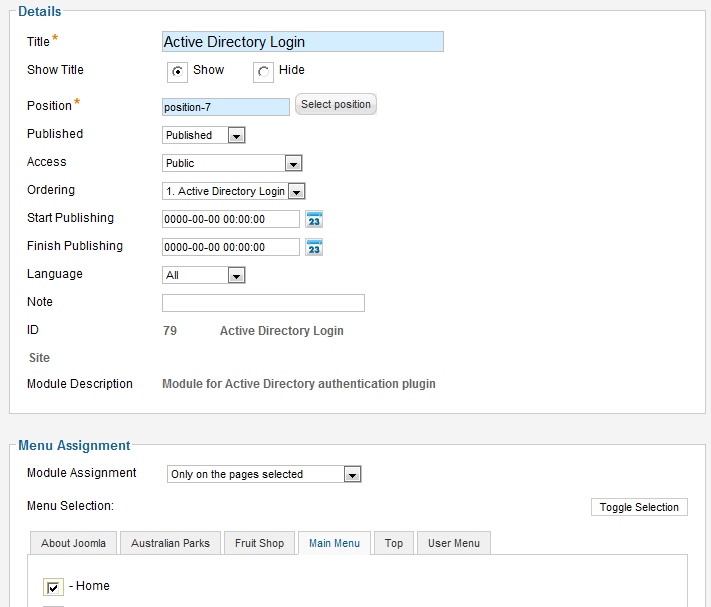Difference between revisions of "Active Directory Login Module"
From Joomla! Documentation
(New page: This document describes how to enable Active Directory Authentication for Joomla!<br /><br /> '''Prerequisites''' <ol> <li>Joomla 1.5 or 1.6</li> <li>PHP 5.2 with mhash & mcrypt and Op...) |
m (added Category:Server configurations using HotCat) |
||
| (11 intermediate revisions by one other user not shown) | |||
| Line 1: | Line 1: | ||
| − | This document describes how to enable Active Directory | + | This document describes how to enable Active Directory authentication module for Joomla!<br /><br /> |
| + | '''Introduction'''<br /> | ||
| + | Active Directory Login module for Joomla, will allow Joomla sites to have Authentication using an Active Directory Federation Service (ADFS) 2.0 enabled server using the WS Federation Protocol. Using this module Joomla user accounts can be associated with an Active Directory login identity, there by Active Directory credentials can be used to login to Joomla site. <br/><br/> | ||
'''Prerequisites''' | '''Prerequisites''' | ||
<ol> | <ol> | ||
| Line 8: | Line 10: | ||
</ol> | </ol> | ||
<br />'''Active Directory Relying Party Configuration'''<br /> | <br />'''Active Directory Relying Party Configuration'''<br /> | ||
| − | Active directory Relying party configuration is described in a separate document. Please refer to [[ADFS | + | Active directory Relying party configuration is described in a separate document. Please refer to [[ADFS 2.0 Relying Party Trust Configuration]]<br /> |
Relying party endpoint URL should be configured in the relying party configuration. This url is different for joomla 1.5 and joomla 1.6. It is as follows | Relying party endpoint URL should be configured in the relying party configuration. This url is different for joomla 1.5 and joomla 1.6. It is as follows | ||
<ul> | <ul> | ||
| Line 16: | Line 18: | ||
Joomla base url in the above is the base site url where joomla is configured. The 3 different parameters needed from Active Directory Federation Service to configure the Plugins are as follows | Joomla base url in the above is the base site url where joomla is configured. The 3 different parameters needed from Active Directory Federation Service to configure the Plugins are as follows | ||
<ol> | <ol> | ||
| − | <li>ADFS Endpoint URL ( | + | <li>ADFS Endpoint URL (Ex: <nowiki>https://adfsdemo2.com/adfs/ls</nowiki>)</li> |
| − | <li>SP Identifier/Realm of Relying party trust ( | + | <li>SP Identifier/Realm of Relying party trust (Ex: urn:federation:php.cloudapp.com)</li> |
<li>Relying party trust certificate installed</li> | <li>Relying party trust certificate installed</li> | ||
</ol> | </ol> | ||
| Line 25: | Line 27: | ||
You need to download component, module and plugin extensions for the specific version of Joomla. | You need to download component, module and plugin extensions for the specific version of Joomla. | ||
<ul> | <ul> | ||
| − | <li>For Joomla 1.5, download | + | <li>For Joomla 1.5, download the corresponding extensions from http://joomlacode.org/gf/project/activedirectory/frs/</li> |
| − | <li>For Joomla 1.6, download | + | <li>For Joomla 1.6, download the corresponding extensions from http://joomlacode.org/gf/project/activedirectory/frs/</li> |
</ul> | </ul> | ||
<br />'''Install Joomla Extensions'''<br /> | <br />'''Install Joomla Extensions'''<br /> | ||
| + | Once you enable this module, you will be able to login to Joomla sites using your Active Directory account which is associated with your Joomla account. | ||
<ul> | <ul> | ||
<li>Login to Joomla Administration Site</li> | <li>Login to Joomla Administration Site</li> | ||
| Line 92: | Line 95: | ||
<li>ADFS Component is displayed in the Components Menu item. Currently there is no view required/implemented for this component but is displayed in Joomla 1.6.</li> | <li>ADFS Component is displayed in the Components Menu item. Currently there is no view required/implemented for this component but is displayed in Joomla 1.6.</li> | ||
</ul> | </ul> | ||
| + | |||
| + | </ul></br> | ||
| + | '''Contact'''<br /> | ||
| + | <ul> | ||
| + | <li>Email to interop@schakra.com for any issues and feedback. </li> | ||
| + | </ul> | ||
| + | |||
| + | [[Category:Server configurations]] | ||
Revision as of 20:46, 26 May 2013
This document describes how to enable Active Directory authentication module for Joomla!
Introduction
Active Directory Login module for Joomla, will allow Joomla sites to have Authentication using an Active Directory Federation Service (ADFS) 2.0 enabled server using the WS Federation Protocol. Using this module Joomla user accounts can be associated with an Active Directory login identity, there by Active Directory credentials can be used to login to Joomla site.
Prerequisites
- Joomla 1.5 or 1.6
- PHP 5.2 with mhash & mcrypt and OpenSSL enabled.
- Configure the Joomla site with https so that ADFS can communicate through SSL
- Active directory federation service with Relying party trust set up to your domain/site.
Active Directory Relying Party Configuration
Active directory Relying party configuration is described in a separate document. Please refer to ADFS 2.0 Relying Party Trust Configuration
Relying party endpoint URL should be configured in the relying party configuration. This url is different for joomla 1.5 and joomla 1.6. It is as follows
- Joomla 1.5 - <joomla Base URL>/plugins/authentication/adfshandler.php
- Joomla 1.6 - <joomla Base URL>/plugins/authentication/adfs/adfshandler.php
Joomla base url in the above is the base site url where joomla is configured. The 3 different parameters needed from Active Directory Federation Service to configure the Plugins are as follows
- ADFS Endpoint URL (Ex: https://adfsdemo2.com/adfs/ls)
- SP Identifier/Realm of Relying party trust (Ex: urn:federation:php.cloudapp.com)
- Relying party trust certificate installed
SP Identifier configured in ADFS should exactly match with the one configured in the plugin.
Download Joomla Extensions
You need to download component, module and plugin extensions for the specific version of Joomla.
- For Joomla 1.5, download the corresponding extensions from http://joomlacode.org/gf/project/activedirectory/frs/
- For Joomla 1.6, download the corresponding extensions from http://joomlacode.org/gf/project/activedirectory/frs/
Install Joomla Extensions
Once you enable this module, you will be able to login to Joomla sites using your Active Directory account which is associated with your Joomla account.
- Login to Joomla Administration Site
- Install the provided extensions.
- com_adfs
- mod_adfs
- plg_adfs
Configure Joomla Extensions
Configure the module and plugin for ADFS authentication.
Configure Active Directory Module
It is assumed that you have experience in customizing the existing Login Form module provided by Joomla. If you haven’t done this, you could find more details at http://docs.joomla.org/Customising_the_Login_Form_module.
- Go to ‘Module Manager’
- Customize ‘Active Directory Login’ module.
Screen captures of configuration for different Joomla versions
The below screen captures will show you how to set up the ADFS configuration for different Joomla versions.
Configure Active Directory Plugin
- Go to ‘Plugin Manager’
- Customize ‘Authentication – Active Directory’ plugin, Enter the following configuration params
- Adfs Endpoint URL
- Endpoint URL of ADFS service.
- SP Identifier/Realm
- Service provider (SP) identifier, this should match the SP identifier value configured in ADFS Relying party configuration.
- Encryption Certificate Path (Optional Parameter)
- Enter a certificate path if used to decrypt authentication responses which have been sent encrypted. This value is optional based on whether the encrypted response is configured with ADFS. Acceptable certificate format is ‘.pem’. Absolute path of the certificate file on the server should be provided.
- Encryption Certificate password (Optional Parameter)
- Encryption certificate password can be used in conjunction with Encryption Certificate provided. The password is the key to the certificate in such case.
- Adfs Endpoint URL
- Enable ‘Authentication-Active Directory’ plugin
Known Limitations
- During Logout, user is not logged out from ADFS sites. So the user is expected to close the browser session to remove any Adfs cookies or tokens in the current browser session.
- Active Directory Authentication feature is not supported for Joomla Administration Site.
- ADFS Component is displayed in the Components Menu item. Currently there is no view required/implemented for this component but is displayed in Joomla 1.6.
Contact
- Email to interop@schakra.com for any issues and feedback.

